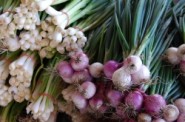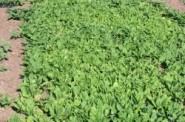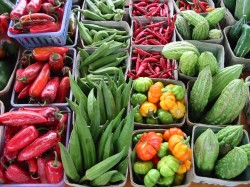Myths About Organic Food
“Organic” produce isn’t what you think. Better to choose Near-Ganic food.
“Are the farmers at your market organic?” People ask me this at least once a week. As I wrote in a previous column, the answer is long and complicated, and I feel like I’m in a race against an invisible attention span timer. Nowadays I ask, “Do you want the long answer or the short answer?”
Here is the long answer: Yes and no.
Yes in the spirit of the first organic rules as they were written in the 1970s. Emphasize quality over quantity. Don’t treat the soil as if it’s a chemistry equation that says if you put in X parts of nitrogen you will get Y bushels of eggplants, but regard the soil as an extension of the plant. Think long term by putting in more nutrients than you take out. Don’t ride above your crops in a $250,000 tractor with an air conditioned glass cab and GPS. Instead walk the fields every day and examine your plants with your hands and learn to listen to them. Don’t spray pesticides when you think you’ll have pest problems. Spray only when you know you’ve got bugs.
No in the sense that the original organic rules have been revised over the years to suit the needs and wants of corporate mega-farms that know there’s big money to be made on organic produce.
No in the sense that modern organic rules have paperwork requirements beyond the capabilities of most small farmers, who would rather keep their produce affordable by not hiring an office manager.
No because small farmers tend to be fiercely independent and proud people who resent having to file paperwork with governmental entities to get a seal of approval. They already know their produce is good.
Yes in the sense that a farmers market tomato is more like the tomato that our great-grandparents ate, before the introduction of truly nasty pesticides like DDT.
Yes because that farmer who smiles when she sees you every Saturday cares more about you and your health than any organic farm corporation ever will.
At this point, if the attention span timer hasn’t gone “DING!” I continue. Many people think that organic vegetables are grown without pesticides. But the truth is that every farm has bug problems, and all organic farmers spray their crops with approved organic insecticides. A 2011 USDA study of organic lettuce found nearly 20% tested positive for organic pesticide residue. Spinosad, for example, is on the list of USDA-approved sprays. It is a derivative of the soil bacterium Saccharopolyspora spinosa, a rare species discovered on a Caribbean island in 1982. It is manufactured by Dow Chemical under their brand name, Entrust, and it attacks the nervous systems of both harmful insects (aphids) and friendly ones (bees). Drink the stuff and you will have to go to the emergency room.
The short answer? Our farmers are “near-ganic” – as close to organic as they can possibly be.
Urban Foodie Question of the Week:
Wisconsin was prominent in a recent column at Mental Floss called “19 Regional Words All Americans Should Adopt Immediately.” Number Four on the list was the wapatuli, “a homemade alcoholic drink with any combination of hard liquors or other beverages—Mountain Dew, white wine and vodka, anyone? A wapatuli can also refer to the occasion at which that jungle juice is consumed.”
I’ve never heard of this before. Does anyone have a recipe to share?
Urban Foodie
-
The Junk Food Debate
 May 14th, 2013 by Young Kim
May 14th, 2013 by Young Kim
-
Tips for Twenty-Somethings
 Mar 15th, 2013 by Young Kim
Mar 15th, 2013 by Young Kim
-
Why Hmong-Grown Produce is Different?
 Dec 5th, 2012 by Young Kim
Dec 5th, 2012 by Young Kim























At our house, we mix vodka and whatever Juicy Juice flavor we have on hand.
It’s called Boozey Booze.
Young,
T.H. suspects that watatuli must be another way of pronouncing Hairy Buffalo. Classic recipe what ever shows up at the party goes into the punch bowl add fruit and off you go….
Great column by the way I’ve been entertained and informed!
T.H.
Traditionaly guests bring a bottle of alcohol to add to the wap. All the alcohol is mixed in a large garbage can or other suitable container. Several different kinds of juice are added along with sliced fruit. Just about any kind of fruit will work.
It is best served over ice in a plastic cup.
There are several different recipes.
Standard Wap
3 bottle 750 ml Blts each Gin, Rum, Vodka ( you can substitute Everclear for one of the bottles)
2 Gallons Apple Cider/Juice
2 Gallons Lemonade
2 Gallons Orange Juice
2 Gallons of Kool-aid
25 Lbs Ice
Chopped Up Fruit
OPTIONAL
1 Case Beer
Mix all in a big big container.
Could you record this while reading it aloud? I’d like to play it for my customers to save time!
Appreciatively Yours,
A Fiercely Independent and Proud Farmer
Great column! I love how you get into the gray area of this and challenge people’s assumptions. My priority when buying my fruits and vegetables has moved more towards considering local and/or scale of the farm first, then whether or not its organic. Know your farmer!
Thanks everyone!
I wasn’t able to fit in a funny little factoid that I learned just last week. Truly old school farmers don’t need to submit a soil sample to a lab to learn about soil nutrient content. They just pick up a dirt clod and lick it.
– Young
Good article. I might add simply talking to the famers at the farmers market goes a long way to understanding more about where your food comes from and building a relationship that ensures quality.
I learned the rules for making Wapatuli (I’ve never seen the word spelled before.) in the Marquette dorms: clear liquors only and any kind of juice or Kool-Aid on hand.
Wapatuli? Is the “l” silent? I always thought it – phonetically – was Wapatooey. However, I did grow up on the south side. And, I may have beer bonged Wap once. Maybe. Now that I am grown up, I would never do that. Unless, of course, if the apples in the juice were organic. Or locally grown. That would be OK. But, I am guessing the cover charge would be more than $2. This stuff is so confusing. I need a drink.
Very useful article. Of note, earlier this year I was negotiating the development of a 3-acre aquaponics greenhouse operation in San Francisco. The northern California produce distribution center for Whole Foods agreed to purchase all the lettuce we could produce even though it wouldn’t technically be organically certified because they were transporting organic lettuce up from San Diego. As they said, ‘In this case, local trumps organic for us because [1] it decreases the carbon footprint from fossil-fuel based transportation, and [2] local, in and of itself, is important for its job creation and community building aspects.’
Don’t know the measurements but something like this…
Grain alcohol
Whiskey
White soda
Powdered lemonade mix
Beer
Sounds weird, but turns out great.